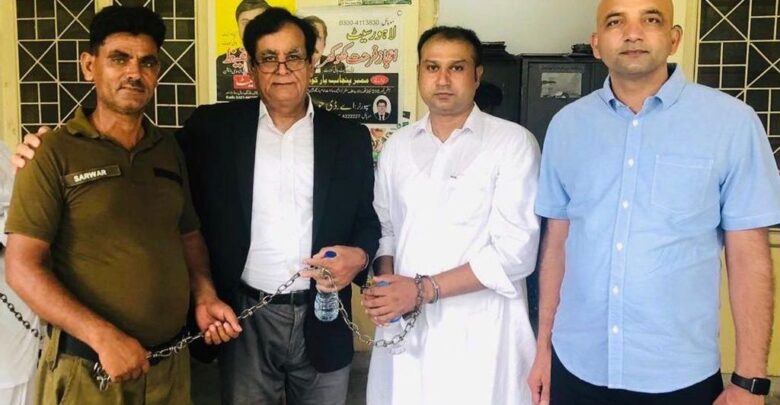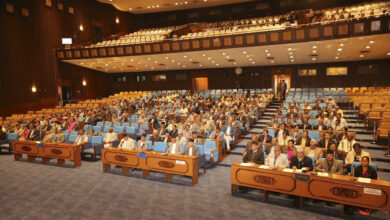

Saif Malook left Pakistan’s Lahore High Court with his head held high on June 3.
He had secured freedom for his clients, Shagufta Kausar and her husband Shafqat Emmanuel, impoverished Pakistani Christians sentenced to death for blasphemy. Their convictions had just been overturned on appeal.
But almost immediately, Malook’s smile faded as extremists took to social media with threats to end his life.
“They called me an agent of the Jews, and many of the threats the Pakistani government determined to be credible,” he said from his home in Lahore.
“They even post pictures of the two judges who heard the case and declared them infidels too. This could have long-term implications. Judges will be scared after seeing this.”
While Malook, a Muslim, accepts the consequences of his work as one of the last lawyers willing to represent Christians on blasphemy charges, the impact spreads to his wife, a mathematics college professor, and his 15-year-old daughter in high school, both of whom also endure public taunts.

“My neighbors won’t talk to me; members of my family hate me too,” Malook said. “But I am working for these helpless people (Christians) because it is the right thing to do.”
His security situation has become more perilous in recent weeks after the courts overturned the death sentences of Kausar and Emmanuel.
The Christian couple was convicted in 2014 of disparaging the Prophet Muhammad, a severe crime under blasphemy legislation that prohibits the “act of expressing contempt or a lack of reverence for God or sacred things.” The crime carries the death sentence under Pakistani law, although capital punishment has never actually been carried out.
According to the charges, the couple sent a series of abusive text messages insulting the Prophet. Malook saif neither Emmanuel nor Kausar is literate enough to have sent such communications.
While no one has been executed for the crime of blasphemy in the majority-Sunni Muslim country, dozens connected to such cases have been killed by mobs or lone killers.
Last July, Tahir Ahmad Naseem, a Pakistani-born American citizen, was shot dead in the Peshawar High Court as he took the stand on blasphemy charges.
Naseem, who lived in the Chicago suburbs until traveling to Pakistan in 2018, was an Ahmadi. The sect is seen as heretical by mainstream Islam, and members are a target for blasphemy accusations in Pakistan.

Human rights groups claim that it is part of a pattern: Blasphemy accusations are routinely used to harm minorities and settle personal grievances.
“Blasphemy is regarded as a worse crime than murder,” said Juliet Chowdhry, a spokesperson for the British Asian Christian Association.
“Police fudge blasphemy investigations, district courts ignore statutory procedure and resort to Sharia adherence to satisfy baying mobs or in response to receipt of a bribe.”
Outcasts from Pakistan
Malook said his latest clients remain in prison despite having been acquitted and will need to leave Pakistan when they are freed. “Once the judgment is signed, and they are released from the prison, they won’t be able to stay in Pakistan,” Malook said.
“Already there are a lot of people after them. They have no choice but to leave.”
In late April, the European Union Parliament passed a resolution calling for tariff exemptions issued by the bloc on Pakistani exports to be revoked and asking that all member states issue emergency visas and provide the couple with international protection.
Malook said the couple — who have not seen each other since their arrest seven years ago — have suffered psychologically and will require professional help.
“Their four children are also destroyed, moving from different relatives in different cities and schools for their safety,” he said. The eldest is now 20 and the youngest is 10 and has no recollection of her parents.
Emmanuel, who is disabled and wheelchair-bound, is imprisoned in Faisalabad’s District Jail, while his wife remains in the Women’s Jail Multan, the only jail for females in Punjab province.
Shagufta has languished in the same 6-by-6 cell formerly occupied by fellow Christian Asia Bibi, arguably the most high-profile blasphemy case in Pakistan. Bibi was accused of using derogatory words about the Prophet Mohamed in 2009 following a disagreement with co-workers while harvesting berries.
Malook took on Bibi’s defense after her then-attorney was assassinated by his own bodyguard in 2011.
Both Bibi and Shaqufta were held for long stretches in solitary confinement, Malook said, permitted to see sunlight for only a half-hour per day and served three small meals, mostly comprising oil-swathed vegetables and dhal.
After languishing on death row for almost a decade, Bibi’s conviction was overturned in October 2018. Malook had told Pakistan’s Supreme Court that there was insufficient evidence to convict.
The ruling led to weeks-long, violent unrest nationwide. Bibi was eventually able to leave in May 2019, becoming a refugee in Canada.
Appeal to the international community
Though Malook has devoted much of his professional life to those in dire judicial need in his home country, he is now making an appeal to the international community in the hope of securing a haven in the West.

“I would like to join Asia (Bibi) and her family in Canada,” Malook said. “My only wish now is to be able to spend my last years in peace.”
Despite the death threats, Malook, who earned his degree specializing in criminal law at the University of Punjab, Lahore, in 1980, is continuing the pursuit of justice while appealing to Western nations for further help.
“No other lawyers want to take on these cases — no person has a life hereafter taking on blasphemy cases, and there is no money in it. Those accused are very, very poor,” he said.
“The whole time, you are under threat, even from normal people who tell me I am supporting those who commit blasphemy.”
To be in prison, facing such an allegation, he said, “is one of the worst things a human can endure.”

“Every Muslim from the cooks and convicts to the guards will see that person as the enemy, see them with hatred, and they are in constant danger of being harmed,” he said.
“The mental health of even the strongest person accused of blasphemy deteriorates with the tension and the pressure.”
Focus on a current client on death row
Malook is now focusing on bringing attention to his latest client, Asif Pervaiz, a destitute Christian garment factory worker sentenced last September to hanging for the crime of blasphemy.
His ordeal began in 2013 when his boss, according to Malook, pressured him to convert to Islam.
When Pervaiz refused, the superior went to the authorities with claims the worker sent a series of text messages smearing the prophet.
Malook said that, at the time, anyone could purchase a SIM card without identification, meaning there would be no verifiable evidence such messages came from Pervaiz. The attorney is confident that the death sentence will eventually be overturned on appeal, but the process takes many years. Meanwhile, Pervaiz remains in prison.
“Asif has very small children, and now they have no house and no food,” Malook said.
“I don’t know how many more years he will be in jail — but the moment someone is sentenced to death, there is nothing I can do but watch their health go down, down, down.”
Human rights advocates say the blasphemy laws persistently hang over the heads of Pakistan’s Christian minority.
“The number of Christians being accused of blasphemy shows no sign of dissipating. Just this year, two nurses who were cleaning a locker were beaten to near death, accused and arrested for blasphemy after they removed stickers that contained Islamic scripture they could not read because it was in Arabic,” Chowdry said, in reference to an incident in January at a hospital in Karachi.
“These nurses had placed their lives and the lives of members of their family to help COVID-19 patients, but their sacrifice meant little to an increasingly fundamentalist society.”

Christians total between 2 million and 3 million Pakistanis and make up around 1.3 percent of the country’s population according to its 2017 census. Most are considered to be among the country’s lowest socioeconomic group.
But it is Muslims who are the major target of the anti-blasphemy laws.
The U.S. Commission on International Religious Freedom (USCRIF) estimates that at least 80 people — the vast majority of them Muslim — are behind bars in Pakistan, accused or convicted of “blasphemy” crimes.
In 2019, the National Commission for Justice and Peace, which was founded by the Catholic Bishops Conference of Pakistan, warned that the laws were being used to persecute minorities.
It found that between 1987 and 2018, a total of 776 Muslims, 505 members of the Ahmadi sect, 229 Christians, and 30 Hindus were accused under various clauses of the blasphemy law, not all of which carry a death sentence.
The USCRIF reported last year that there had been a “sharp spike in blasphemy cases being registered in Pakistan,” which Malook attributes to the rising quest to settle personal vendettas.
“It wasn’t until 1986 when the crime of blasphemy was punishable by death; before that, there were almost no cases,” Malook said. “After that, the people who made the allegations started to feel empowered.”
Pakistan accounts for around a quarter of the world’s state-enforced blasphemy cases, according to USCRIF’S 2020 Report.

USCIRF’s 2021 Annual Report found that 30 Christians were reportedly in prison in 2020, accused of or convicted of blasphemy, including seven on death row.
It said that during the Shia Muslim holy month of Muharram, which fell in August 2020, more than 40 claims of blasphemy were made to authorities, mostly targeting Shia Muslims.
“In our 2021 Annual Report, USCIRF recommended that the U.S. State Department re-designate Pakistan as a ‘country of particular concern,’ or CPC, for engaging in systematic, ongoing, and egregious violations of religious freedom,” said USCIRF Commissioner, Anurima Bhargava.
“We also recommend that the U.S. Congress advocate for the release of religious prisoners of conscience in Pakistan.”
Pakistan’s Embassy in Washington, D.C., did not respond to requests for comment.
A total of 84 countries had criminal blasphemy laws on the books as of 2020. Pakistan, Mauritania, Brunei and Iran are the only countries that impose the death penalty for blasphemy.
“Researchers found cases of state enforcement against alleged blasphemers between 2014-2018 in nearly half — 41 countries, or 49 percent — of the 84 countries with criminal blasphemy laws,” Bhargava said
“Pakistan had the highest number of cases of state enforcement, followed by Iran, Russia, India, Egypt, Indonesia, Yemen, Bangladesh, Saudi Arabia and Kuwait.”
(Edited by Hugh Dougherty and Judith Isacoff)
The post ‘I Fear For My Life After Freeing Death Row Christians,’ Says Pakistani Lawyer appeared first on Zenger News.





